| Srl | Item |
| 1 |
ID:
133528
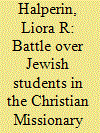

|
|
|
|
|
| Publication |
2014.
|
| Summary/Abstract |
Studies of Jewish students in Palestine's Christian missionary schools largely end at the close of the Ottoman period. But although a tiny and diminishing fraction of Jewish students studied in such schools after the First World War, the mandate period was marked by anxious and often zealous Zionist anti-missionary campaigns. The article considers this space of Jewish-Christian interaction, arguing that even as a Hebrew-dominant society took root, missionary schools provided education in European languages, particularly English, tools that offered advantages to Jewish students with an interest in clerical work or foreign study. The continuing appeal and importance of foreign language skills cast doubt on the Zionist pretence of a self-sufficient Hebrew society.
|
|
|
|
|
|
|
|
|
|
|
|
|
|
|
|
| 2 |
ID:
160943
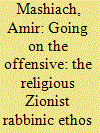

|
|
|
|
|
| Summary/Abstract |
This article examines some of the conceptual changes taking place in religious Zionist thinking in the course of the last three decades, as expressed in the writings of Judea and Samaria rabbis. The Halachic literature produced by these rabbis reinforces the offensive Jewish‒Israeli ethos, a sea change from Halachic texts composed by Diaspora Jews. From the theological point of view, this change is part of the return to the days of biblical-Jewish identity; from an ideological point of view, it is part of the reaction against the post-heroic culture that has infiltrated the IDF and the desire to influence this conceptual retreat from within.
|
|
|
|
|
|
|
|
|
|
|
|
|
|
|
|
| 3 |
ID:
084586
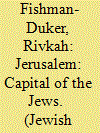

|
|
|
| 4 |
ID:
189414
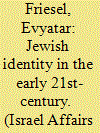

|
|
|
|
|
| Summary/Abstract |
The social and cultural integration of the Jews into Western society was a central paradigm of modern Jewry. Presently, ideological changes in sectors of ‘progressive’ Western society regarding the Jewish state and the Jews, as well as political and cultural tendencies in Israel, are unsettling the parameters of that paradigm, bringing up new tensions between non-Jews and Jews and changing Jewish profiles. Such multifaceted developments should be understood in the framework of the broader tendencies in Jewish history.
|
|
|
|
|
|
|
|
|
|
|
|
|
|
|
|
| 5 |
ID:
112538
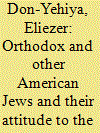

|
|
|
|
|
| Publication |
2012.
|
| Summary/Abstract |
The central argument of Professor Gabi Sheffer in his interesting essay is that since the 1973 war American Jewry has experienced "a gradual process of decreasing loyalty to Israel and increasing criticism of it." He relates this process to two main factors. One of them is the growing integration of American Jews in their surrounding society and the other is the weakening of their Jewish identity.
|
|
|
|
|
|
|
|
|
|
|
|
|
|
|
|
| 6 |
ID:
096642
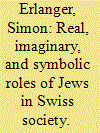

|
|
|
|
|
| Publication |
2010.
|
| Summary/Abstract |
Numbering just under eighteen thousand, Jews constitute a tiny fragment of Switzerland's population of 7.7 million. Nevertheless, Swiss public discourse is preoccupied with things Jewish. This goes back at least as far as the first centralized Swiss state. The Helvetic Republic, founded in 1798, fell apart largely over the issue of Jewish emancipation. This issue remained at the very center of the Swiss political discourse up to 1868 when, under U.S. and French pressure, Switzerland granted equal rights to the Jews. Having benefited from foreign intervention, Jews in Switzerland have come to symbolize unwanted change and foreign influence. Moreover, the special, bottom-up character of the Swiss body politic, with its semiautonomous cantons and communities, has enabled medieval stereotypes to survive into modernity. The medieval image of the Jew as the religious Other has thus transformed into the image of the Jew as the essential Other against which, for most of the twentieth century, Swiss identity was defined.
|
|
|
|
|
|
|
|
|
|
|
|
|
|
|
|
| 7 |
ID:
157523
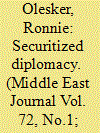

|
|
|
|
|
| Summary/Abstract |
This article addresses the Israeli demand during the 2013–14 peace negotiations that Palestinians recognize Israel as a Jewish state within the context of securitization theory. Contrary to many readings, this article argues the demand was not merely a tactical ploy to delay or derail the peace process but rather was part of a broader process of making Israel's Jewish identity a matter of national security. The application of securitization theory beyond the liberal nation-state is also examined.
|
|
|
|
|
|
|
|
|
|
|
|
|
|
|
|
| 8 |
ID:
187006
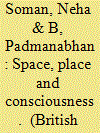

|
|
|
|
|
| Summary/Abstract |
The notion of space is central to Jewish civilization as it evolved over complex geography. Amos Oz, the prominent Israeli writer explores the continuity of cultural and spatial experiences of Jewish populace in the land of Israel. This paper focuses on interpreting Oz’s image of Israel and the psychological multiplicity of Jewish civilization in A Tale of Love and Darkness, his memoir of family saga and national history. Oz’s arguments regarding the collective Jewish consciousness in connection with the distributed geographical space is analysed as a chronotopic discourse. The memoir deconstructs Oz’s Sabra image attributed by the Zionist ideology and offers a post-modern dynamic narrative constructed well within the notions of time and space. A spatial reading of the memoir explores the existential ties between Jews and the land of Israel.
|
|
|
|
|
|
|
|
|
|
|
|
|
|
|
|
| 9 |
ID:
171677
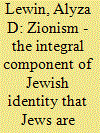

|
|
|
|
|
| Summary/Abstract |
The yearning and determination of Jews to re-establish their Jewish homeland in the Land of Israel is “Zionism” – an integral component of Jewish identity. It is more than the political movement launched in the 1800’s. The deep religious, ancestral, and ethnic connection of Jews to the Land of Israel is as old as Abraham and the Bible. Jewish messianic movements brought Jews to Israel between the 13th and 19th centuries, proving the Jews’ historic sense of peoplehood and their belief in the “ingathering of the exiles.” Only in the 18th century did Jews first shed this element of Jewish identity because European governments demanded this surrender in exchange for citizenship. Why are Jews demonised and marginalised today when they express support for Israel? It is a modern manifestation of the antisemitic pressure on Jews to shed the national and ethnic part of their Jewish identity. Discrimination against anyone who observes the Jewish Sabbath, wears a kippah, or maintains a kosher diet is universally recognised as antisemitism. It is equally antisemitic to marginalise or harass Jews for expressing the Zionist component of their Jewish identity. Isolating and dehumanising Zionists is akin to branding Jews with a virtual “yellow Star of David.” To ensure that history does not repeat itself, we must forcefully condemn this modern mode of antisemitism.
|
|
|
|
|
|
|
|
|
|
|
|
|
|
|
|